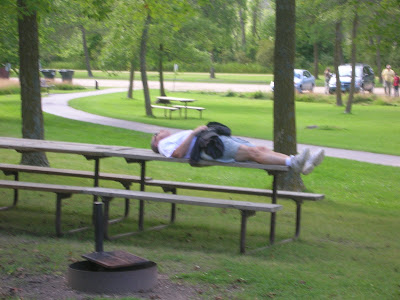On June 26, 2008, I wrote an entry about
Poppy, my daughter’s cat, who came to stay with us on a temporary foster-care basis in August of 2007. It is now August of 2009, and my daughter is finally coming home this weekend to pick up her cat.
It gives new meaning to the term “temporary.”

Poppy loves living with Tom and me because we are retired people who let her in and out, in and out, all day long. After two years, she finally has us
very well trained.
But she will also love her new home because it has a door that leads directly outside, a front step to hide under (complete with a skittish chipmunk), and a huge evergreen tree with floppy branches all the way to the ground. Poppy loves a good evergreen tree where she can set up base camp for her life of feline espionage: crouching, spying, and pouncing.
In the past two years of foster care at our house, Tom and I have figured out her little cat personality:
1. Poppy likes to be scratched on her head and ears. But do not, I repeat,
DO NOT touch her hind quarters. Bad things happen to the scratcher who tries to scratch Poppy’s hind quarters. We believe she may have had a traumatic hind-quarter experience as a kitten and could have benefited from counseling and medication at the time. Now we just like to think of it as part of her quirky personality.

Just the head, please--a little to the right.
2. If you are a neighbor cat, you are NOT welcome on our deck after dark. Poppy has a loud, eerie yowl to warn a strange cat away from her territory (and also scare the crap out of the human beings within earshot). Poppy has her own personal neighborhood watch: no strange cats allowed. And that means you, buster.
 Poppy's Lonely Vigil on Night Watch
Poppy's Lonely Vigil on Night Watch3. If you are Hobie, the permanent, rightful cat resident at our house, expect to be harassed. Frequently.

“Wazzzuuuuuup? Yo, where’s your sense of humor, homie?”
4. If there is a carpet in front of a closed door, Poppy believes it is possible to tunnel a hole through the carpet and under the door. After two years of never actually tunneling out, she still believes it might be possible—a cockeyed optimist. Her proof: the carpet is definitely much thinner than it was two years ago.

5. Sometimes, it just feels good to curl up on a pillow, a bed, or somebody’s 98.6 degree lap. If the lap belongs to the friendly little Frenchman who says he doesn’t like cats, all the better.

So on Sunday, we’ll be packing Poppy into her little pet carrier and sending her off with her rightful owner. She’ll miss having two well-trained retirees at her beck and call (cats are a little narcissistic—all about
numero uno). She’ll probably even miss grumpy old Hobie, although not necessarily on an emotional level. Rather on an entertainment level.
Don’t tell my daughter, but Tom and I will probably miss Poppy a little, too.
 Temperature: 72 degrees.
Temperature: 72 degrees.
 . . . and your hand.
. . . and your hand. And it gives you time to reflect that it’s the end of August, so summer is almost over.
And it gives you time to reflect that it’s the end of August, so summer is almost over.










































